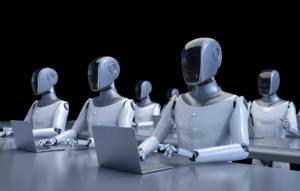Ads
The use of artificial intelligence (AI) in the workplace is becoming increasingly common, with many workers citing it as a basic skill that is helping them advance in their careers. Despite the rapid growth of AI technology and its adoption by companies around the world, a recent analysis by the Pew Research Centre found that the majority of U.S. workers do not currently use AI in their day-to-day work. However, for those who do incorporate AI tools into their work routine, the benefits are significant.
Early adopters of AI chat platforms such as ChatGPT, Gemini, or Copilot have reported that these tools have helped them work faster and more efficiently. In fact, 79% of individuals who use AI chat for business purposes stated that it had helped them improve their work speed, while 72% noted that AI had significantly enhanced their overall job performance.
To gain a deeper understanding of how AI is improving work performance and to explore whether the experiences of these early AI adopters are indicative of a larger trend, we spoke with five AI super users. What we found was a range of innovative ways in which AI is being utilized to streamline workflows, enhance productivity, and develop new skills.
One such example is Ruth Favela, an AI Marketing Manager at Tomorrow.io, who leverages AI tools to compete with larger marketing teams without increasing overhead costs. By using AI to generate high-quality content, draft text, clean lists, and summarize meeting transcripts, Favela is able to focus on completing tasks quickly and efficiently. She uses an AI video creator called HeyGen to create lifelike video avatars of company executives, which can be used in various marketing materials. This method has significantly reduced production time for video content, allowing the team at Tomorrow.io to focus on creating impactful and engaging material.
Ryan Baum, an independent SaaS growth consultant, uses AI to challenge his biases and identify logical flaws in his work through a tool he calls the “Devil’s Auditor.” By prompting large language models to poke holes in his ideas, Baum is able to refine his thinking, generate new ideas, and make more informed decisions. This tool has been instrumental in helping Baum improve the quality of his work and address potential challenges before they become apparent to his clients.
Sierra Dowd, Founder and Principal Strategist at else&ever, has developed a process that reduces the time spent designing presentations from hours to minutes using AI scripts to create on-brand Canva decks. Dowd collaborates with ChatGPT to generate slide scripts that provide visual instructions for creating presentation decks, allowing her to focus on the quality, clarity, and narrative of the presentation rather than the design process.
Andrea Bonaiuto, head of product marketing at ATPCO, has embraced AI technologies as a standard part of her work routine, using AI tools to coach her team on critical thinking and professional development. Inspired by the coaching capacity of large language models, Bonaiuto created a customized AI coach to help her prepare for important meetings and navigate challenging situations. This AI coach has proven to be an invaluable resource for Bonaiuto and her team, allowing them to scale coaching and critical thinking in a way that was not possible before.
In conclusion, the use of AI in the workplace is not just a trend but a fundamental skill that is helping workers across industries advance in their careers. From saving time on video production to challenging biases and improving decision-making, AI tools are revolutionizing the way we work and empowering individuals to achieve more. As AI continues to evolve and become more integrated into our daily lives, those who embrace this technology stand to reap the benefits of increased productivity, efficiency, and innovation in their professional endeavors.






